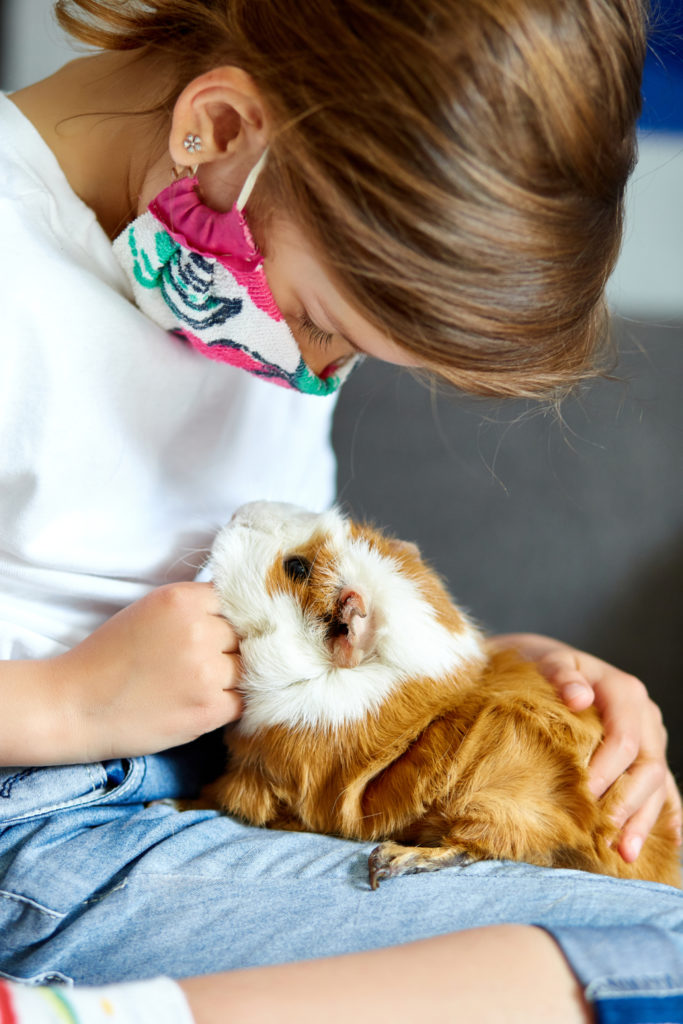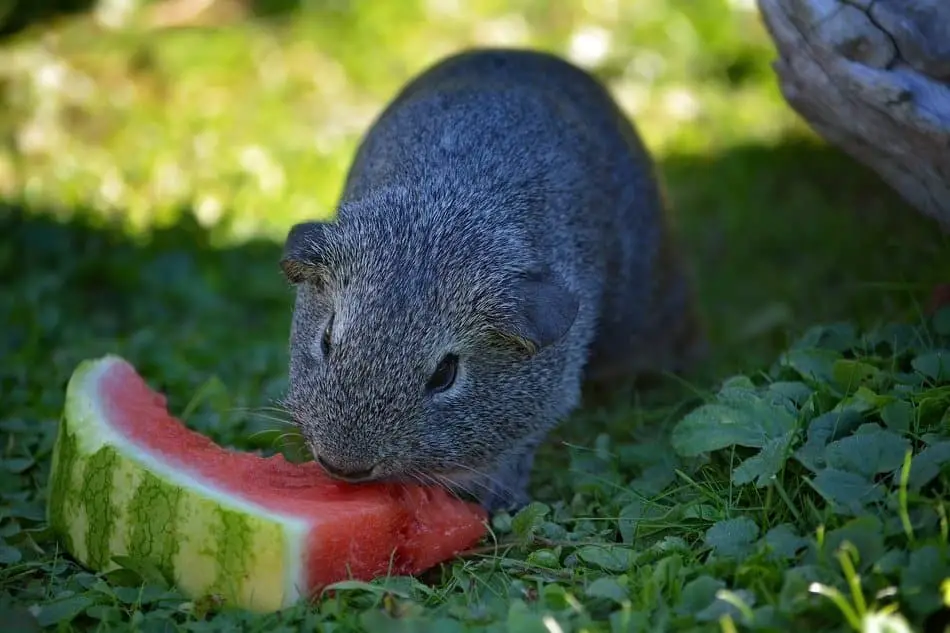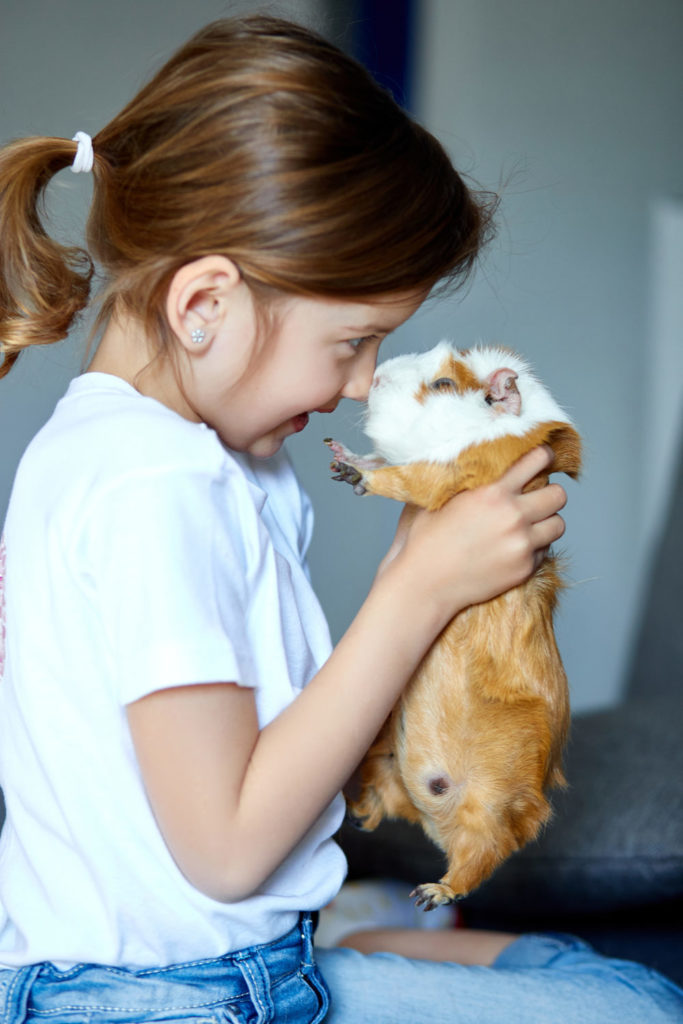Can Guinea Pigs Eat Watermelon Rind? Pros And Cons
Guinea pigs can consume a wide variety of fruits and vegetables, and the whole watermelon is a feast for them. Some guinea pigs enjoy eating the rind of watermelons even more than the red part. Wash the skin properly and make sure you are giving fresh watermelon rind.


We all are familiar with watermelons and very often buy a huge watermelon to satisfy our hunger. This giant fruit is an excellent source of sugar and water. Watermelons are one of the best hydrating treats, especially in the summer. It is also scientifically proven to contain vitamins and minerals at optimal levels.
In this article, we present a complete discussion on can guinea pigs eat watermelon rind, its nutrition facts, pros-cons of watermelon, and many more topics that you may need to know. So, keep scrolling to learn more!
Quick Facts About Watermelons
- Watermelons contain 92 percent water.
- There are more than 1200 varieties of watermelon. The classifications are seeded, seedless, icebox, yellow, or orange.
- Watermelons can be both fruit and vegetable.
- There are cube-shaped watermelons in Japan, and they are commonly grown in a glass box to achieve the shape of a cube.
- Watermelons are abundant in vitamins. The juice can help relieve muscle tension.
- There is only 6% sugar in watermelons.
- China holds the title of the highest producer of watermelons.
- You can eat all parts of the watermelon, including the rind.
- Watermelons help reduce inflammation in the body, and they do not contain any bad fat or cholesterol.
- There are 96 countries in which watermelons are grown.
Pros Of Eating Watermelon Rind
Can guinea pigs eat watermelon rind? You may ever feel in a conflict that, is it safe to allow a guinea pig to eat watermelon rind? Here are just some of the benefits of feeding your tiny creatures with watermelon rind:

-
Prevents scurvy
Scurvy can result if there is a lack of Vitamin C in the body of your guinea pigs. Why do they lack Vitamin C? Their body cannot produce it naturally. Thus, sources such as fruits(Pineapple) and vegetables(pumpkin) are necessary. If there is a deficiency of Vitamin C, your furry friend might suffer from different diseases.
Some symptoms of scurvy are loss of appetite, diarrhea, and bleeding. If this happens, consult a veterinarian immediately.
-
Rich in antioxidants
Watermelons contain Vitamin A and lycopene. This vitamin is an antioxidant that helps boost the immune system and overall growth of your guinea pigs. Antioxidants protect the cells of your guinea pigs against free radicals.
-
Prevents complications
Watermelons contain zinc and betaine. These two prevent upset stomach, cramps, and diarrhea that often brings severe complications in the long run. The overall function and performance of their digestive tract will improve since guinea pigs have a sensitive stomach.
-
Potassium and iron
The potassium that you can find in watermelon eliminates the formation of kidney stones in their body that is a common issue when dealing with guinea pigs. However, iron regulates healthy blood and its flow and helps in fighting anemia.
Nutritional Facts About Watermelons
So, now take a look at the nutritional value of a watermelon that your pet needs.
-
Vitamin C
Vitamin C is one of the vitamins that you must add to your pet’s diet. According to dietitians, a guinea pig daily needs 30-50 mg/kg vitamin C. As the body of the guinea pigs cannot produce vitamin C; you must give them a supplement.
Watermelons will be your ideal option to provide enough vitamin C. Vitamin C is essential for building up the robust immune system of your pet and keeping it healthy.
-
Sugar
Watermelons are an excellent organic source of sugar. Sugar is a vital nutrient that you and your pet need. Watermelons, especially the red part of themselves, supply a significant amount of sugar. But, You must keep in mind that too much sugar is not good for guinea pigs.
High sugar content fruit may reveal diabetes and obesity for these furry creatures. It’s better to give them a tiny amount of watermelon flesh with the rind. Thus, you can successfully control the amount of sugar in your guinea pig’s diet.
-
Fiber
Fiber is a dietary material containing substances such as cellulose, lignin, and pectin, which are resistant to the action of digestive enzymes. Watermelons are a great source of fiber. You should give much fiber to consume your guinea pigs.
Watermelon is a tasty treat that contains fiber, but the amount is not sufficient for a guinea pig. It’s better to slice a watermelon with its rind, which will provide extra fiber. And excessive amounts of watermelons can be harmful to your pet.
Risks To Consider
How do you spell happiness? W-A-T-E-R-M-E-L-O-N-S. Giving this mouth-watering fruit to your guinea pigs will surely make them happy. Watermelons can serve as a refreshing treat for your pets. However, feeding watermelons to their guinea pigs may lead to their downfall once you have neglected certain conditions.

So how do you prevent this from happening? It is easy. You only need to know the risks you should consider when feeding watermelons to your guinea pigs.
-
Urinary tract complications
The rinds of the watermelon contain some calcium traces that can harm the urinary tracts of the cavies. Providing your guinea pigs with an excessive amount of watermelon rind can lead to bladder and kidney stones, pain during urination, blood in urine, and urinary tract infections.
-
Possible ingestion of pesticides/insecticides
Spraying insecticides and pesticides on vegetables and fruits has become common nowadays. Providing your guinea pigs with unwashed watermelons can lead to the possible ingestion of pesticides or insecticides.
-
Indigestion
Guinea pigs are unable to ingest too much sugar. Providing an excessive amount of the pinky fleshy part of watermelon may lead to cramps, stomach pains, flatulence, loose stool, and diarrhea.
Are Watermelon Rinds Safe For Guinea Pigs?
Guinea pigs are allowed to eat a wide variety of fruits. A few of these fruits are apples, bananas, berries(Can Guinea pig eat blackberries), plums(can Guinea pig eat plum), and of course, watermelon rinds. There is no harm in watermelon rinds.
Although these provide fiber, vitamins, and minerals, we discourage giving fruits to your cavies daily. Watermelons should also be served in adequate quantities to keep your pets’ digestion in good shape.
Read on as we answer your questions further!
What other parts of a watermelon can guinea pigs have?
This article has answered whether guinea pigs can eat watermelon skin. However, other parts of watermelon are also edible for your piggies!
The flesh of a watermelon is a source of vitamins for your pets, but you can only give it as an occasional treat. Although packed with nutrients, this part contains high amounts of sugar that could affect their digestive system.
Avoid feeding the seeds of watermelon to your cavies. These pose a choking hazard and could affect the breathing track of your pets. If you plan to provide this fruit to your pets, you need to remove the seeds beforehand to protect your guinea pigs.
How often should I feed my guinea pigs watermelon rinds?
The skin of a watermelon is more nutritious for your cavies than the flesh. However, avoid feeding them daily. The rind contains high amounts of fiber that could affect their bowel movement.
Consider giving them watermelon rinds 2-3 times a week. But, of course, the same goes for the flesh itself, too.
How to prepare watermelon rinds for your guinea pigs?
Watermelons are the smiles of summer. So put a smile on the face of your pet by giving them a slice of summer. To further discuss whether guinea pigs eat watermelon rind, let us dive into the methods of preparing them.
First, choose a watermelon that has no odd lumps nor bruises. Unripe watermelons have field patches that are white or green. Thus, find one with a yellowish patch. Second, thoroughly wash the skin of the watermelon to eliminate pesticides that are harmful to guinea pigs.
Third, remove the seeds. Although the white seeds are edible, removing all the black and white to avoid choking is safer. And last, take note that guinea pigs are unable to eat the whole watermelon. Cut the rinds into 1 inch by 2 inches per piece. Take note that you should slice the watermelon into smaller portions, and only half a cup per guinea pig is allowed.
Which watermelon is the best for guinea pigs?
The nutrients of the watermelon maximize once it is fully ripe. Also, it is heavier due to its water content. The rind or skin should be smooth and dulled slightly on the top portion of the fruit.
Moreover, the bottom of the fruit should be yellowish. A green or white patch indicates that the watermelon is not mature enough.
Final Words
This article has pondered on the question: can guinea pigs eat watermelon rind? We tried our best to respond to all of your queries. However, take note that feeding watermelon rinds to your cavies should come with a great sense of responsibility and adequacy.
Only a small amount of rind should be given to guinea pigs, that too not frequently. Rinds can bring more harm to your pet’s health than good if given in an inappropriate quantity and more frequently.
Constantly be reminded to take care of your guinea pigs’ health. Good luck and best wishes for your furry pets!
